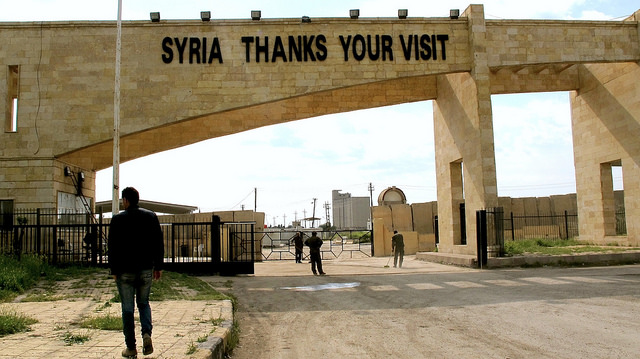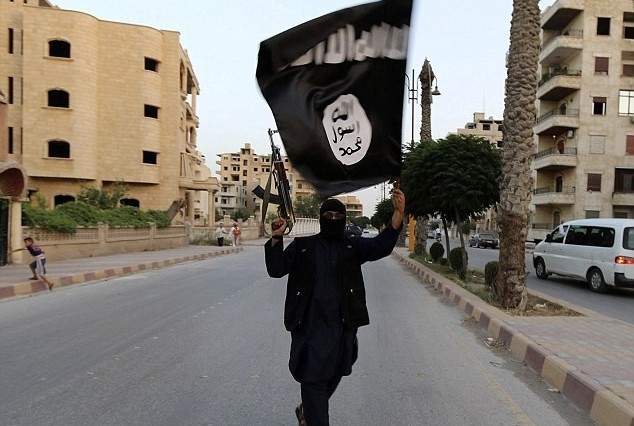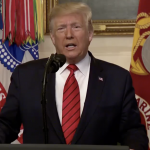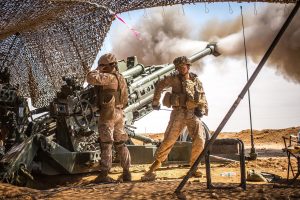by Wayne White
Alongside the wave of Syrian Kurdish refugees into Turkey this month is an equally unsettling story: alarming gains by the Islamic State in an offensive against a potential ally. Syria’s Kurds carved out their own regional bastion extending west from their main base in the extreme northeast corner of Syria. For two years they have fiercely defended their lands against the Islamic State and other extremists, employing many thousands of veteran Kurdish fighters.
Yet due to these fighters’ ties with the militant leftist Kurdistan Workers Party (PKK)—a designated terrorist organization in the United States and Turkey—and an alliance of convenience of sorts with the Assad regime, the US and the Islamic State’s (ISIS or ISIL) other foes have held them at arm’s length. Stemming from all this could be severe damage to, and possibly the eventual loss of one of the most effective contingents of indigenous anti-ISIL boots on the ground in Syria.
The Syrian Kurdish World
Comprising roughly 9 percent of the Syrian population, Syrian Kurds mostly inhabit the country’s extreme northeast al-Hasakah Governorate wedged between Iraq and Turkey, plus large swathes of real estate across northern Syria extending westward. Since 1970, the Kurds have had profound differences with the authoritarian Assad regime, toward which their leading parties pose a threat. So the PKK and other Kurdish parties seeking independence or greater autonomy were banned and suppressed.
Still, given Syria’s adversarial relationship with Turkey, Damascus turned a turned a blind eye toward (or was unable to prevent) PKK operations against Turkish targets during various periods, especially between 1980-99. With or without central government approval, many PKK elements have also been sheltered in Kurdish northwestern Iran and northern Iraq (the latter resulting in numerous Turkish anti-PKK air strikes in Iraqi Kurdistan over the past 20 years).
Despite past differences, Syrian Kurds opted not to attack Syrian forces and maintained a rather distant relationship with Damascus. Since Kurds in Turkey, Iraq, Iran and Syria have had an uneasy relationship with non-Kurdish rulers and local communities for a very long time, Syrian Kurds were wary of Sunni Arab Syrian rebels. That fear grew with the increasing Muslim militancy of large numbers of rebels. So, for over two years, markedly secular Kurds, mostly alone, successfully fought off first the al-Nusra Front and then ISIL.
Although limited passenger flights from Damascus (along with a few scattered aerial deliveries of supplies and ammunition) have occurred, the regime and the Kurds remain wary of each other.
In mid-2012, a number of Syrian Kurdish militias formed an interim administration for an autonomous region, the Kurdish Supreme Committee (KSC). The unity initiative was taken despite opposition from the rival PKK-allied Syrian Democratic Union Party (PYD) but with reluctant agreement from Damascus, which pulled most Syrian troops out of Syria’s Kurdish region, and released over 600 Kurdish political prisoners.
After clashes between KSC forces and the PYD’s robust militia, an accord was reached for joint rule. Despite the Assad regime’s tentative cooperation, both the KSC and PYD are well aware that if Damascus ever regains its pre-rebellion sway across Syria, it almost certainly would try to re-impose central control over Hasakah and other Kurdish areas.
Prospects and Barriers
Displeasing Damascus, but with the ISIL threat clearly growing, PYD-affiliated units farther to the west partnered on Sept. 10 with several Free Syrian Army (FSA) brigades in a coordinated effort called the “Joint Operations Room.”
In addition, since June, a contingent of Syrian Kurdish combat veterans was rushed over to Iraqi Kurdistan to bolster the sagging Kurdish defenses. A large number of crack PYD militiamen also participated in cutting an escape corridor through ISIL defenses to save Iraq’s besieged Yazidis on Sinjar Mountain.
Turkey naturally holds Syria’s Kurds in low regard for harboring the PKK (and related groups), which is why Turkey initially refused to allow large numbers of Syrian Kurds fleeing ISIL to take refuge across the border (until Sept. 19 after 3 days of balking). The Turks also have been wary of the many hundreds of young Kurdish males heading into Syria to bolster desperate Syrian Kurdish forces trying to hold back ISIL. Turkish security forces have even blocked quite a few who are now camped out along the border.
The PKK warrants its branding in the West as a terrorist group. A 2013 PKK assassination in Paris, albeit part of internecine Kurdish feuding, showed the group remains active. However, now facing an existential threat from ISIL (the main driver behind its alliance of convenience with Damascus), the entire Syrian Kurdish community of many political tendencies has one focus: defense of its homeland against a more menacing ISIL.
The US and the West have had no meaningful contacts with Syrian Kurdish forces because of past attacks by the PKK against Turkey, in Western Europe, and, most recently, Kurdish links to the Assad regime. The PYD representative in France, Khaled Eissa, told Reuters early this month, however, that there had been Western signals of changing positions. US military officers met with PYD military counterparts on Mount Sinjar last month, but conversations only concerned the Yazidi evacuation. Some of Turkey’s NATO allies, according to Eissa, were apparently trying to reassure the Turks enough to initiate meaningful contacts with Syrian Kurdish leaders.
Exploding Crisis
While diplomacy stalled, ISIL struck. Focusing on less concentrated Syrian Kurds west of Hasakah, ISIL knifed deeply into Kurdish holdings (employing heavy weapons so close to the border today that two shells fell into a Turkish vineyard). The offensive’s main objective is Kobani (Ayn al-Arab), Syria’s third largest Kurdish town, driving over 150,000 Kurds into Turkey.
Despite desperate Syrian Kurdish pleas for airstrikes by the US-led coalition against ISIL forces (particularly heavy weapons) in Kobani for some days, no air support was provided until Sept. 25 when three strikes hit that area. Reports from Kobani indicate those strikes were ineffective (hitting empty ISIL positions). So far today there apparently have been none—only strikes far to the east near Hasakah. ISIL currently appears to be squeezing Kobani from three sides.
The White House has repeatedly emphasized the need for (and shortage of) indigenous boots on the ground to capitalize on airstrikes to hold, surround, and drive back ISIL. In this instance a combative secular military force numbering in the tens of thousands has been left to fend for itself because of its tentative alliance of convenience with the Assad regime and the association of some of its cadres with terrorism (although a brand far less malignant than that of ISIL). And yet this force has come to the aid of coalition forces twice.
Well beyond the question of aiding Syria’s Kurds against ISIL, Ankara has been a disappointment. Although a longstanding NATO member, it refused to host NATO combat aircraft operating against ISIL. It had also shown little interest in making a serious effort to block the export of ISIL oil products into Turkey or the influx of foreign fighters to ISIL. Only on Sept. 25 did the Turkish army finally crack down on oil and related ISIL smuggling. Ironically, the more ISIL benefits from Turkish resistance to taking risks, the greater the tsunami of Syrian refugees descending into Turkey becomes.






Erdogan’s top priority has always been to protect the country’s economy. The reason is simple. This has been the AKP’s only success story and that is what is keeping it in power. A fall of the economy will mean the fall of the AKP and Erdogan’s dreams of grandeur.
Erdogan is highly suspicious of his country’s own army, therefore it prefers not to have to use it within the country or outside. In addition a state of war would discourage investments and would affect the economy.
This is why Erdogan has tried to build peace with the Turkish Kurds with whom Turks are in war for decades. He has also refused to participate in any military intervention in Iraq and in Syria.
Erdogan’s ambitions and business-religious beliefs brought him to have ambitions on fragile Arab countries such as Egypt and Syria. When the ‘rebels’ he supported failed to topple the Syrian government, he got desperate and allowed Islamists fighters to enter Syria, hoping they would topple Bashar al Assad. This created what is now known as ISIS and Al Nusra
Now Turkey is been pushed to intervene militarily against its own threatening creation. With elections looming in June 2015, the time is short and Erdogan will have to make painful decisions.
If he decided to attack ISIS and they retaliate with terrorist actions, Turkey’s economy is in danger of retracting. The population would also object at attacking other “pious” sunnis. The AKP’s popularity may fall and with it Erdogan’s dreams of giving himself more power with a new Constitution.
If he decides no to do anything, Turkey will appear as been an accomplice to ISIS and may be boycotted by the West and he may loose the Turk-Kurds momentum of peace.
A tough time for Erdogan.
Gotta love this sentence: “The White House has repeatedly emphasized the need for…indigenous boots on the ground to capitalize on airstrikes…”
Considering who is behind ISIS-IS or what ever convenient name given, when the different so-called elements of the military does its thing[s], consider that this whole show is just that, show. The new made in Washington P.R. rooms name for the latest threat, proves that there isn’t any real concern, but you can bet the collateral damage will be in the mix. All the competing neocon departments looking for bragging rights along with covering their backsides due to failure so far, and let’s not mention the Intelligence departments of the U.S., only someone who has been underground for the past 14 years without any sort of communications with the world above, can expect any good to come out of this, though the unpaid tax bills will still be presented. Oh, and just what is behind Israel protecting ISIS-IS in the Golan from the Syrians?